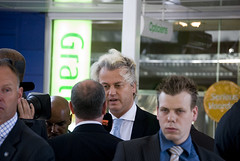Having met several Dutch friends over the last two days, there´s been one issue popping up in every chat: the success of anti-Islam populist Geert Wilders and his party PVV. The question is what explains his growing success and what is the needed response.
In the European Parliament elections Wilders´ PVV grew into the second biggest party winning certain key areas such as Rotterdam and The Hague. These are also the cities with some of the highest numbers of people of non-Western descent. His party has now 4 seats in the European Parliament, which is one more than the Greens, the Social Democrats or the two Liberal parties. He is serious business.
His biggest target are the Muslims in the Netherlands. He has has for instance suggested a 5-year ban on non-Western immigration. He has publicly confessed a hatred of Islam. Wilders´ agenda is largely similar to many other populist parties. His party is basically built around him as the undisputed leader, he makes a clear distinction between himself and "The Hague elite" and says the country has drifted into an "anything goes" sort of cultural relativism. He calls for tough measures and wants the country to declare openly an Judao-Christian value basis.
In the discussions I have had, I have heard different analysis of his support. I find all of them intriguing as they call for different solutions. As one knows from medicine, one needs to identify the illness correctly to ease the pain. There´s no need for surgery, if the problems are psychosomatic.
Analysis 1: The people voting for Wilders are ignorant and only if they would understand that immigration is beneficial for the Netherlands, we would all be better.
Solution: Isolating Wilders from the other political parties and increasing contact between groups.
Analysis 2: Wilders´ support builds on disappointment on one´s fellow citizens. The people voting for him feel like they have been left behind not only by the government but also the people who are doing better.
Solution: The elite needs to sharpen up and use emotional strategies to build a sense of belonging stressing to themselves and to the disappointed people that we are a whole and that we have responsibility for each other.
Analysis 3: We are in a culture war. Wilders represents a different society model, which gains support from a large part of the society. Similarities can be found from the US on issues such as euthanasia, abortion and race.
Solution: Both sides need to sharpen up their argumentation. Wilders´ great challenge is creating an intellectual basis for his policy as the party matures.
I don´t want to take a stand on the matter apart from ruling out number one. I sense an undemocratic flavour in it and find it disturbingly arrogant. I am all for increasing contact but it cannot start from the notion that the other side is seen as a victim of false consciousness.
In some ways I find the emotional aspect quite appealing. A lot of people are feeling scared even when they cannot actually give the fear a name. And for a person in panic, the newcomer is an easy scapegoat. Large parts of the population feel a risk of losing all their life is based on. We as a society need to take these fears seriously. Fear needs to be tackled not only with rationality but with emotion.
This situation should be seen by all parties as a possibility to be clearer on what kind of future you are fighting for. If we really are in a culture war, it is time for everyone to get more clever, sharper and more active. The good thing is that at least until now this dissent on the current rule is channelling largely through elections.
Despite which explanation one follows, one thing remains. It is all about bringing politics back to politics.
Showing posts with label laura kolbe. Show all posts
Showing posts with label laura kolbe. Show all posts
Wednesday, June 24, 2009
Thursday, February 28, 2008
Class Dismissed
Today over lunch at work we had a heated discussion on diversity. It was pointed out that very often people make assumptions on your background purely based on your nationality or looks and it seems to be widely shared notion that we all have a middle class background. Also I have heard several times the comment:"Oh you would not understand, you come from Finland." This usually refers to me not understanding hardships or conflicts or social struggle. These are often people who have never been to Finland and who easily mix Finland with for instance Sweden which has not had a war in centuries. A colleague of mine mentioned wisely today:"I mean we spend eight hours together every day and you know nothing about my family but you make a lot of assumptions."
Last weekend I read with great pleasure my friend Laura Kolbe's book on social classes in Finland. The goal of Professor of European History Kolbe and Cultural Anthropologist Katriina Järvinen was to break the silence on socio-economic backgrounds in Finland and shed light on the fact that we all do not belong to the middle class and that social mobility works both ways. The book is based on interviews and addresses issues of shame, humiliation and joy in a fresh and rare manner. Kolbe and Järvinen encourage us all to talk openly about class.
They pick on a highly important issue. Finland is not a flat society where everyone has the same chances. Although the social mobility in general has been rapidly upwards over the last few decades, only between 2003-2007 more than 100.000 new people were classified as poor in Finland. Finland had last year 650.000 people earning less than 750 euros per month (from a population of 5 million). Accidentally, in the project that I run, the researchers of Demos were last week in Finland interviewing young people and it was heartwarming to hear from them that the Finnish teenagers are concerned about the growing difference between the haves and the have nots.
To join Kolbe's and Järvinen's movement, I could say that I have belonged to the middle class all my life, maybe even upper middle class. My parents are part of the generation that experienced the fast urbanisation of Finland and who still believe passionately on the empowering role of education. We were never swimming in money but we never lacked a single thing. The economic recession of Finland in the 90s did not influence me in the same way as it did my friends from Eastern or Northern Finland. I remember one of my best friends telling how she saw it all through her mother working as a social worker and her father running his own company.
I am part of the generation Kolbe describes as the generation from the suburbs with detachment to the nation state and not a strong sense of community to the physical surroundings. Me and my friends belong to subscenes in Finland which can also be found from other European countries. My relationship with the countryside could well be described as awkward.
But I am conscious of my background. My mother comes from a big family which experienced the high price Finland paid after the Second World War. My grandmother had to abandon her home within a few hours and they were settled to a new part of Finland. On my father's side our family brings together Swedish-speaking bourgeois and Finnish-speaking working class. My uncle was a worker's son who was exceptionally allowed to play on the tennis court of the better people. Even our last name is part of the story of a birth of a nation: Lindstedt was changed into Laitio as part of the patriotic dream of an independent Finland.
I am grateful for the opportunities Finland has given me but I don't think it is all of my own doing. In my work I see constantly that we do not start from an even playing field. Class still matters in the same way as gender or ethnicity. Only for raising your own class consciousness, I recommend reading the book.
Last weekend I read with great pleasure my friend Laura Kolbe's book on social classes in Finland. The goal of Professor of European History Kolbe and Cultural Anthropologist Katriina Järvinen was to break the silence on socio-economic backgrounds in Finland and shed light on the fact that we all do not belong to the middle class and that social mobility works both ways. The book is based on interviews and addresses issues of shame, humiliation and joy in a fresh and rare manner. Kolbe and Järvinen encourage us all to talk openly about class.
They pick on a highly important issue. Finland is not a flat society where everyone has the same chances. Although the social mobility in general has been rapidly upwards over the last few decades, only between 2003-2007 more than 100.000 new people were classified as poor in Finland. Finland had last year 650.000 people earning less than 750 euros per month (from a population of 5 million). Accidentally, in the project that I run, the researchers of Demos were last week in Finland interviewing young people and it was heartwarming to hear from them that the Finnish teenagers are concerned about the growing difference between the haves and the have nots.
To join Kolbe's and Järvinen's movement, I could say that I have belonged to the middle class all my life, maybe even upper middle class. My parents are part of the generation that experienced the fast urbanisation of Finland and who still believe passionately on the empowering role of education. We were never swimming in money but we never lacked a single thing. The economic recession of Finland in the 90s did not influence me in the same way as it did my friends from Eastern or Northern Finland. I remember one of my best friends telling how she saw it all through her mother working as a social worker and her father running his own company.
I am part of the generation Kolbe describes as the generation from the suburbs with detachment to the nation state and not a strong sense of community to the physical surroundings. Me and my friends belong to subscenes in Finland which can also be found from other European countries. My relationship with the countryside could well be described as awkward.
But I am conscious of my background. My mother comes from a big family which experienced the high price Finland paid after the Second World War. My grandmother had to abandon her home within a few hours and they were settled to a new part of Finland. On my father's side our family brings together Swedish-speaking bourgeois and Finnish-speaking working class. My uncle was a worker's son who was exceptionally allowed to play on the tennis court of the better people. Even our last name is part of the story of a birth of a nation: Lindstedt was changed into Laitio as part of the patriotic dream of an independent Finland.
I am grateful for the opportunities Finland has given me but I don't think it is all of my own doing. In my work I see constantly that we do not start from an even playing field. Class still matters in the same way as gender or ethnicity. Only for raising your own class consciousness, I recommend reading the book.
Labels:
class,
family,
finland,
identity,
katriina järvinen,
laura kolbe,
literature
Subscribe to:
Posts (Atom)













